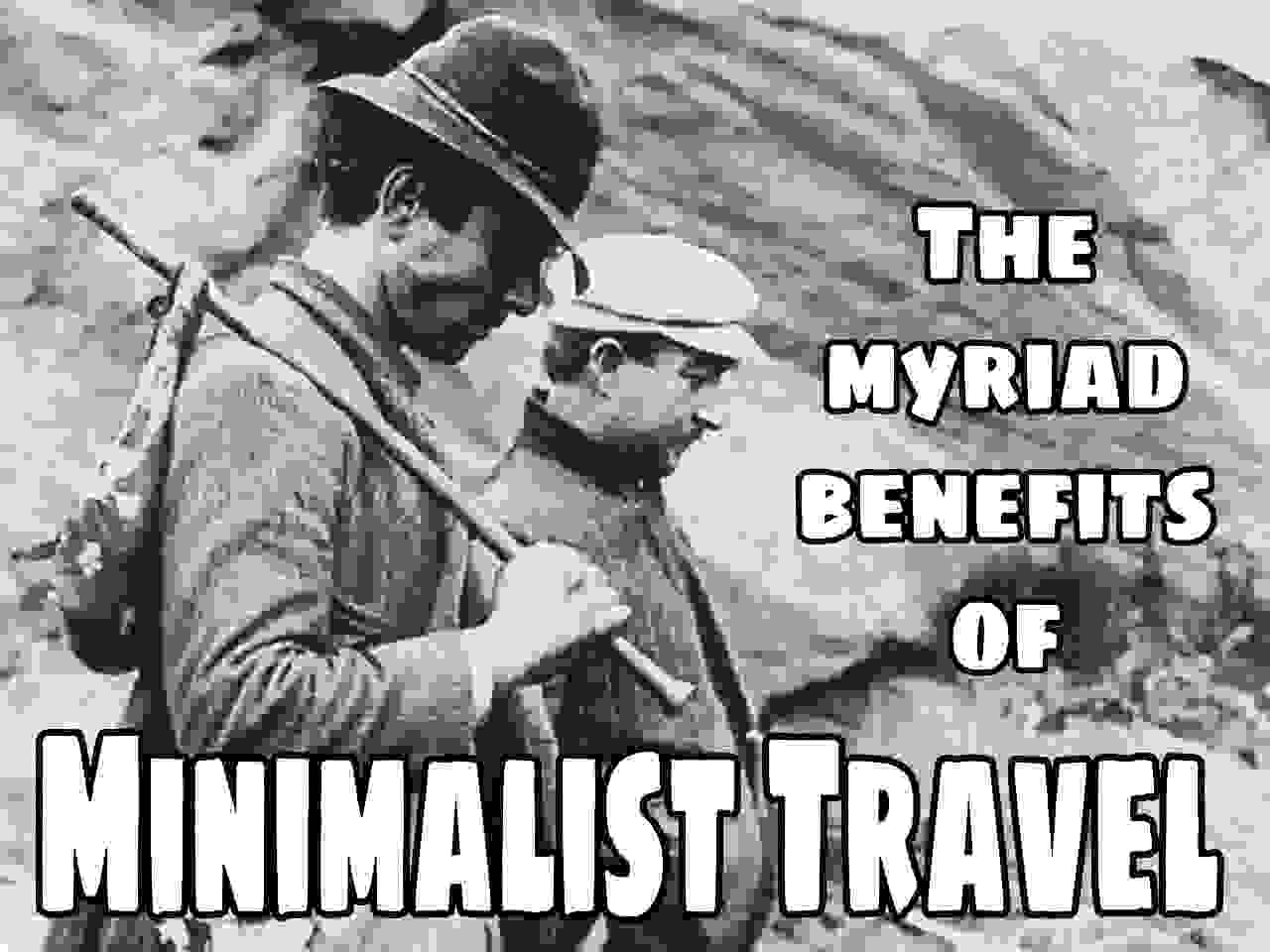Traveling amplifies nuisance. Each and every tiny little issue becomes several orders of magnitude more annoying than it would at home, where you can return to your comfortable abode of air conditioned glory whenever the need may arise. When you’re in the middle of nowhere and something goes wrong, it often goes incredibly wrong.
I learned these lessons the hard way, in snowy winters and blazing summers, where my laughably incapable supplies were no match for the below-freezing chill or the above-body-temperature swelter from which I could find no escape.

Luckily I had a few high-quality items, and quickly learned to make use of only the best gear I had brought with me. So despite bringing a nearly-full 55 liter pack, I only bothered using the 20 liters at the top. I was too lazy to unpack the damn thing, and I was doing laundry often enough that I didn’t have to.
But if I could get by with a relative minimum of items and ignore the rest, I could only think, “what if I only bring high-quality travel gear?”
On the next trip, that’s all I brought. And I’ve never gone back.
Why minimalist travel is not about compromise
A lot of people think minimalism is about limiting yourself, whether in terms of comfort, style, adaptability, or whatever. Quite a few travelers make assumptions about what needs to be done (“But then you can’t have nice clothes!”), and then avoid minimalism like the plague.
None of this is true. Minimalism is not about compromise; it’s about efficiency. Instead of bringing “nice” outfits in addition to “regular” outfits, you can just bring a few outfits that look nice and function properly, and then you only need half the gear. And although this can often be quite challenging (like when hiking pants have all those ridiculous zippers), it’s easier to accomplish than a lot of people might expect.
And, if you can make it work, minimalist travel brings with it a number of exquisite benefits.

1) Minimalism is blazingly fast
If you can simplify your life to the size of a carry-on, your airport security experience will shift from being an inexplicably awful ordeal that breaks your spirit and diminishes your faith in humanity, and into a utopia of blissful convenience that warms your soul. By comparison, anyway. But it will literally save you hours and hours of annoying airport waiting times:
- You can get on a plane without checking a bag. You know all those people waiting in line, kicking their bags along the floor every few minutes as the line moves forward? You can bypass this ordeal entirely by using automated check-in machines, or checking in online, so you can go straight to the security line.
- You can get off a plane without dealing with baggage claim. This is good enough on its own, but have you ever gotten stuck waiting for hours because your luggage didn’t arrive on the same flight? Or, even worse, your bag never arrives? It sucks. Which brings me to the next point:
- You’ll never lose a bag. Not on a flight, anyway. Even if it’s insured, imagine arriving in Paris with only a few days to visit, and having to spend several hours buying new clothes. If everything is with you at all times, this is a non-issue.
- You’ll be first in line for customs. Immigration lines usually run into bottlenecks because they massively expand whenever a flight lands, and might otherwise be completely empty. If you can skip the baggage claim routine, you can often be the first in line (or, at the very least, 200 places ahead of everyone else who was on your flight), allowing you to go through customs in a matter of minutes, or even seconds, rather than potentially several hours.
I’m not sure why these advantages aren’t more actively pursued, especially by those who complain about how irritating it is to fly, and how long it takes to drop off and pick up their luggage.
I’ve even seen families go on week-long vacations, where they had a laundry machine the whole time, yet every single person brought a suitcase that had to be checked. Their bags didn’t arrive on the flight home, so they had to sit in the airport for 4 hours waiting for their unnecessarily heavy luggage, and they complained the whole time about how awful it was. Yet somehow none of them ever attempted traveling lighter after this ordeal. Oh well.
2) Minimalism has no fees
While we’re on the subject of airports and luggage nuisances, it’s a good time to point out that a minimalist setup will save you the hassle and expense of fee-happy airlines, as well as reduce or eliminate a few other costs:
- You’ll save on bag fees. Specific savings will vary based on specific airlines, as they all have their own rules, but if you fly rather frequently, minimizing your travel gear will cut out the expense of flying with overweight bags.
- You’ll take fewer taxis. I’ve seen people with bags so big that they were literally incapable of walking with them over long distances, so they took taxis for what could have been a 20 minute walk. It might not be such a big deal in cheaper countries, but it can add up quickly if it becomes a frequent routine. Besides, isn’t a little exercise nice anyway?
- You’ll skip luggage storage fees. This isn’t likely to occur so often, but if you’re traveling from one city to another while stopping at a picturesque village while en route, you can walk around with your bag while you visit, instead of paying for a few hours of storage. You also won’t need to worry about which items to bring or leave behind. This saves time as well.
Minimalism can admittedly include some up-front costs, such as buying the gear to make it work (though you can use regular clothing, especially if you have access to laundry machines), but if you can save $20 per flight by skipping bag fees, minimalism can pay back its potential costs.

3) Minimalism is simple
I love to simplify. I despise owning things that aren’t enhancing my existence, and if they start weighing me down, they’ll find themselves on eBay shortly thereafter. This is especially helpful while traveling, when you’ll want to spend your time traveling, rather than managing. By carrying a relative minimum of gear, you’ll find yourself skipping a number of minor nuisances:
- Less digging for things. If you carry fewer things, you don’t have to spend time finding them. Packing cubes and suitcase-style openings can be quite helpful, though minimizing the grand total number of items still makes a huge difference anyway.
- No ironing. I refuse to buy anything that gets wrinkly, just on principle, because we have the technology to stave off such nuisances. It can be challenging to find low-maintenance items that also look good, but remember that you only need a few of them anyway.
- No mismatching items. One of the stipulations of a minimalist travel setup is to bring items that work with every other item, so you don’t have to bring extra gear to match, or spend time finding them. This is true for color as well as style; it’s nice to bring things that can be dressed up or down, rather than outfits that only work for fancy occasions.
- No unused garbage. One of the most common refrains from first-time backpackers is “I brought way too much.” I remember someone who brought three dresses, and used zero of them. It’s much better to bring a few things you’ll use frequently, rather than haul extra gear you’ll never use.
I would say simplification is one of the most underrated advantages of minimal travel; many backpackers complain about having to dig through their gigantic bags to find one or two items that were stuck at the bottom, or how their hiking boots are way too heavy and barely ever get used (which is why you should travel with only one pair of shoes), or how they realize half their gear is unnecessary for one reason or another. Issues like this come up all the time, which is why I prefer minimalist setups that avoid them altogether. If you won’t miss it, why bring it?
4) Minimalism is comfy
I am a scrawny weakling for whom even a tiny amount of gear will cause crushing shoulder excruciations and drive me insane. This was a major motivation for minimizing the gear setup in the first place, and is part of the reason I obsess over tiny weight savings. While the huge brawny backpackers can haul 80 liter packs all day long with no problems, there’s no way I could keep up without my entire skeletal system collapsing into a pile of bony shrapnel.
Besides, it’s not just comfort that minimal setups provide:
- You’ll go farther. Between the reduced packing time and higher walking speed, you can often get more done in a day than if you had to deal with overloaded bags. Unless you take taxis everywhere…but that gets pricey.
- You’ll go faster. Which is especially helpful when that’s the last train for three days and argh I haven’t sprinted this fast since high school gym class.
- You’ll be less annoyed. Traveling can be incredibly stressful, especially when the Ravenna train station security guards lock you inside the waiting room in the middle of winter for the entire night (thanks, guys!), but if you’re able to reduce the complications under your control, it’s easier to respond to the complications not under your control.
And again, I would point out that you should bring clothing that’s physically comfortable, as well as stylish and presentable, which will keep you nice and comfy, physically or otherwise, in whatever situation comes your way.
How little is too little?
For all the potential benefits of shrinking a travel gear setup to an absolute minimum, it can be taken too far. There are people out there who travel with only two sets of clothes, a toothbrush and some deodorant (and I think they’re adorable), but that’s not something that would objectively work for everyone.

I try to recommend a setup that does work for everyone, in all situations, so that minimalism is not a compromise. You shouldn’t feel held back, whether in comfort or style, regardless of whatever situation comes your way. If you hate not having a comfy pair of jeans, well, go ahead and bring some. Just keep the overall setup simple and functional, and you’ll be fine.
I’ve drawn up an ultralight packing list with specific recommendations for individual items, but the basic idea is to limit yourself to a carry-on sized travel pack (I’ve mentioned some favorites here), and fill it with a week’s worth of clothes. Do laundry once a week, and you can travel forever. It’s really that simple.
You don’t even need high-tech gear to accomplish this. Quick-drying clothing will allow you to go even more minimal, but it’s not absolutely necessary to do so. And it also means that if you have a decent setup that’ll handle all sorts of travel-related situations, from lounging to classy dining, you’re only a few steps away from having a non-travel, general-use minimalist wardrobe that’ll handle any situation that comes your way.
Hitting the minimalist travel sweet spot
I think a good target for anyone is to hit the carry-on only limit, because it’s incredibly doable, and brings with it a number of advantages, from carrying comfort to airport nuisance reduction, while still allowing you to carry quite a wide selection of clothing and other gear. It’s certainly possible to go even lighter, but hitting the carry-on threshold is a maximum benefit/minimum effort bullseye. So give it a try, and see how far it takes you.





For me, the biggest benefit is certainly the comfort. Things go so much smoother, quicker and easier. TOn the last trips, i always only carried a backpack while my companions often had multiple bags and trolleys. What I noticed is, that I walk way faster and am generally faster at things (getting prepared, packing, leaving the hotel etc.)
Planning is key. I have always had a packing list that I reviewed afterwards (which items I used/ didn’t use) to improve it. It really makes me happy
Hey man. Great article on minimalist travel. You outline the benefits to traveling light really well. I travel everywhere with just a backpack and it’s great. I never miss a thing that I don’t bring.